Rachael writes:
Like much of the Christmas story, the journey of the Wise Men (Luke 2.1-12) can begin to feel like any other myth, legend, or fairy tale. We know it well but it’s something from another world. These travelers from the East (maybe Kings themselves? or Magi: priests, astrologers, and magicians?) with their gifts of gold, frankincense, and myrrh, are more well-known than the angels and their declaration of the glory of God. Even with the primary 7 pupils who attended The Christmas Journey, we had to work hard to get them to think of other things you might bring a baby, they were so keen to share their knowledge of this part of the story.
We’ve lost something of the wonder or mystery of this story. There’s little to no sense of awe to accompany it but it is wondrous and mystical. It’s an epiphany!
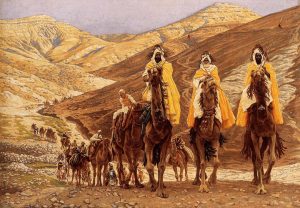 Tisso, “Magi” These were strangers from the East, or more literally, “from the rising of the sun”. Their name suggests that they were of the priestly Magos class in the Zoroastrian religion from the Persian empire which stretched from modern day Eastern Syria to the fringes of India – that’s anything from about 500 to 2500 miles away. On foot. Through foreign lands. For a star. A prophecy. A King.
If the shepherds show us that Jesus came for the lowliest in society, the Wise Men show us that he came for all the world. They are strangers in every way – in ethnicity, nationality, and religion. They are truly aliens in a foreign land. Nobody was expecting them but still they came. And now they are fellow heirs, members of the same body, and sharers in the promise of Christ’s Good News.
They came, following the star. A light in the sky but not a neon sign, with an arrow saying “Here!”. An unusual brightness but not a google maps print out nor a set of sat nav directions. Imagine their excitement at first seeing it, as their prophecies had foretold. Imagine their questions. Their fears and anxieties. Imagine their hopefulness for all that it might mean. Did you notice that they saw the star rise and then travelled Jerusalem, to their best guess as to the location of the King of the Jews? They saw a sign and they headed out, not knowing if they were correct but using the knowledge that they had to do their best.
And then they ask for help: “Where is the child?”. They don’t presume to have the full picture and they’re not too proud to ask those who might know more. They had lived with these questions through all their travels. I wonder if they were disappointed when the answer was, “Another day’s journey that way…”. I wonder if they knew then that Herod had his own agenda, if they got a sense that this wasn’t a person to entirely be trusted.
Only then does the star move, guiding them more precisely, leading them to the “place where the child lay”. And there they fall on their knees in worship before him. They worship the King in a moment beyond intellectual understanding, a moment of deep knowing: of epiphany. It demanded a response of them so, along with themselves in worship, they offered their gifts – gifts for a King who would face great suffering. How did they know?
These were strangers who followed an inclination, asked for help, discerned the way forward, trusted the light, and who in humble recognition, offered what they had.
It’s the story of faith. We may feel like we know it well, or it may feel more like a story that we’re just beginning. But the thing about these stories is that they can become stale. Like a well-known myth or legend, they can become background noise that we don’t really pay close attention to.
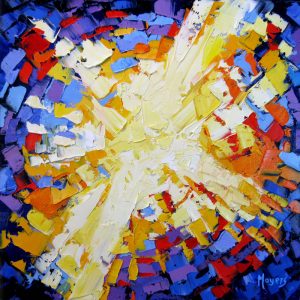 Mike Moyers, “Awake My Soul” The Wise Men remind us that no matter who we are, we are invited on this journey. And there we will see many signs and wonders – perhaps a star in the sky, or a dream in the night, or the kindness of stranger, or the love of a friend – that will point and guide us towards God. Can you remember such an awakening moment in your own life? Are you open to, even actively looking, for more? Along the way, it is good to ask for help: we are not on this journey alone and questions help all of us to grow. God gives us the church as a place of encouragement and discernment because our faith is not one to be practiced alone. There can, however, still be times of darkness and in them, like the Wise Men, we keep putting one foot in front of the other, holding onto hope in the Light that cannot be overcome. We need to continually be discerning our next steps, including how we navigate the twisted value systems of this world that might try to pull us off course. Are we open to dreams and signs and the still, small voice? If we’re going to pay attention to such things, we need to cultivate space in our lives for those moments of recognition and self-giving.
The eucharist is one beautiful place where that can happen. In it we see Christ’s self-giving and in return we together offer ourselves. A single, holy, living sacrifice. A moment of epiphany.
But these things – revelation, discernment, the help of others, self-giving – aren’t things to be relegated to church. We should expect and pursue them in all of life. How will you prepare for, and seek, epiphany in the coming year?
For prayerful pondering:
Name and give thanks for a moment of wonder.
Resolve to offer your gift this year in a particular way.
Name some aspect of darkness and pray for light.
Name a companion on the journey and give thanks for their support.
O God, who, by the guidance of a star,
revealed your only-begotten Son to the nations:
Grant that we, who know you now by faith,
may at the last be led to see your glory face to face;
through the same Jesus Christ, our Lord,
who lives and reigns with you,
in the unity of the Holy Spirit, one God, world without end. Amen.
Posted by Revd Rachael Wright on 1st January 2023 
This year, we’re embarking upon a new adventure.
From January we’ll be offering Living the Questions as a safe space to explore the Christian faith without pressure or presumptions. Together, we’ll dwell in the mysteries of life and faith, and share our journeys of unknowing, assisted by video input from leading teachers and theologians to inspire our conversations.
The first meeting will be an orientation session: a taster and introduction as to what may lie ahead. This will run from 7.30-8.30pm on Tuesday 31st January in St Mary’s Hall with tea, coffee, and cake, provided. Thereafter, meetings will be held on alternate Tuesday evenings, starting with a simple supper before moving into discussion of the materials. Themes in the first few sessions include journeying, taking the bible seriously, and stories of creation. There is no charge, though contributions to supper are welcomed.
If you would like more information or to let us know your intention to come to the orientation session, please contact Nerys or Rachael.
Rachael writes: “What’s in a name? That which we call a rose by any other name would smell as sweet” I’m sure we’re all familiar with these words from Juliet as she tries to convince Romeo that his name, the name of her family’s rival house of Montague, is unimportant. It’s often quoted to suggest that the names of things do not affect the what they really are.
 We know that that is true, in the sense that it is factual. To call a rose a table doesn’t suddenly make it a table. But we also know the importance of names. Parents agonise over what to call their children. There are hundreds and hundreds of websites out there with millions of names listed to help them choose. You can take tests and questionnaires to find the perfect name for your baby. It’s generally the second question asked of parents to be, after what the gender is, “have you chosen a name”. Because in that we think we can grasp something of the (still yet unborn) child’s identity. The name tells us a story, gives us a glimpse of their future. We know that that is true, in the sense that it is factual. To call a rose a table doesn’t suddenly make it a table. But we also know the importance of names. Parents agonise over what to call their children. There are hundreds and hundreds of websites out there with millions of names listed to help them choose. You can take tests and questionnaires to find the perfect name for your baby. It’s generally the second question asked of parents to be, after what the gender is, “have you chosen a name”. Because in that we think we can grasp something of the (still yet unborn) child’s identity. The name tells us a story, gives us a glimpse of their future.
I wonder if any of you have ever changed your name? Maybe your first name in an attempt to reinvent yourself or give a certain impression in a new environment, such as going from family nickname to something more formal, Bob to Robert or Flic to Felicity. You may have decided to go in the other direction and tried to throw off your childhood trauma by changing the name that was used to nag or criticise you, coming up with something new or alternative that you felt better suited your personality. Approximately half of the married people here are likely to have made a change to their name at some point as well. It’s not such the done thing these days, or at least, it’s not just assumed that the woman will take the man’s name. We have friends who combined their names to come up with something new altogether. Of course, for Charlotte and I there wasn’t the same cultural precedent so we got to choose. In the end I took Charlotte’s name and for a long time I found it strange and a little sad to no longer be Rachael Harrison. But now I am a proud Wright, it feels like it fits, and I never think twice about it.
So names are important. They do tell us something about the person they belong to. They are personal and can be deeply tied to our identity. We take them for granted I think but they’re quite powerful really.
The name “Jesus” means “Yahweh saves”— and it is holy in every way. It signifies the bearer’s divine status on account of his supernatural conception by the Holy Spirit, and it spells out the specific mission on which he is sent: to be God’s agent of salvation for Israel, and through Israel, for the whole world.
Gabriel and the angels who appeared to the shepherds, give us many titles for Jesus: Son of the Most High, Son of God, Saviour, Messiah, and Lord. Each is a window into Jesus’ identity and mission. There are many, many more, but they are all encapsulated in “Jesus”.
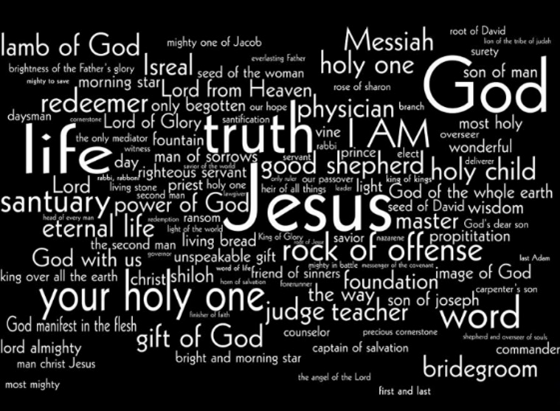 Somehow that name made its way into common parlance as an expletive and that has only served to cheapen something which should be holy and awe-inspiring. We can easily forget the meaning and the one to whom it belongs and throw “Jesus” around like it’s “Jo” “Jack” or “Jane”. There are two contemplative prayers which I use where saying the name of Jesus, though not really the primary function of the prayer, has become a very powerful spiritual practice for me. One is the Jesus prayer (“Lord Jesus Christ, Son of God, have mercy on me a sinner”) and the other is the rosary (“Hail Mary full grace, the Lord is with thee…blessed is the fruit of thy womb Jesus”). It’s declaratory and worshipful, humbling and hopeful, to say the name of Jesus in prayer. Somehow that name made its way into common parlance as an expletive and that has only served to cheapen something which should be holy and awe-inspiring. We can easily forget the meaning and the one to whom it belongs and throw “Jesus” around like it’s “Jo” “Jack” or “Jane”. There are two contemplative prayers which I use where saying the name of Jesus, though not really the primary function of the prayer, has become a very powerful spiritual practice for me. One is the Jesus prayer (“Lord Jesus Christ, Son of God, have mercy on me a sinner”) and the other is the rosary (“Hail Mary full grace, the Lord is with thee…blessed is the fruit of thy womb Jesus”). It’s declaratory and worshipful, humbling and hopeful, to say the name of Jesus in prayer.
“Yahweh saves” – our reading from Galatians 4 is a wonderful development of that tiny phrase and huge concept: “God sent his Son, born of a woman, to redeem those who were under the law, so that we might receive adoption as children. And because you are children, God has sent the Spirit of his Son into our hearts, crying, “Abba! Father!” So you are no longer a slave but a child, and if a child then also an heir, through God”.
Jesus – Yahweh Saves – has come that we might be adopted into God’s Kingdom. And if we can cry “Abba, Father” then we are also called by a new name: “children of God”. Whichever name we might have changed or taken in the past, whatever our parents might have called us, our truest identity is there as God’s precious and beloved children. That is who we belong to. Is there anything more powerful?
As we go forward into this new year, may we treasure these words, this name, and like Mary ponder it in our heart. May we, like the shepherds, glorify and praise God for who God has made us. And like them, may we share this incredible news with all whom we meet, that they too might be amazed.
Our collect for today:
Eternal Father,
who gave to your incarnate Son the holy name of Jesus
to be the sign of our salvation:
place in every heart, we pray,
the love of him who is the Lord of every year
and Saviour of the world;
who lives and reigns with you,
in the unity of the Holy Spirit,
one God, in time and for eternity. Amen.
Posted by Revd Rachael Wright on 14th December 2022
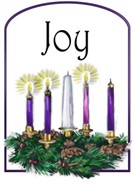
Rachael writes: For the second week, our gospel passage focuses on St John the Baptist (Matthew 11.2-11). Many of us will quickly bring to mind an impression of a somewhat alternative fellow: dressed in camelhair, a wild beard, living off of locusts and honey. I was really struck by what Nerys shared last week though of the faithfulness of this man. Of the lengths that he went to, to be obedient to God’s call, and to point, beyond himself, to the coming Christ.
In our passage today, however, it seems as though this faithful man has a moment of hesitation. Are you the Messiah? he sends his followers to ask from his prison. Are you the one? Or do we need to keep waiting for another? I wonder if you hear a hopeful tone, or a hesitant one? The accompanying question is only implied – am I to stand with you or against you?
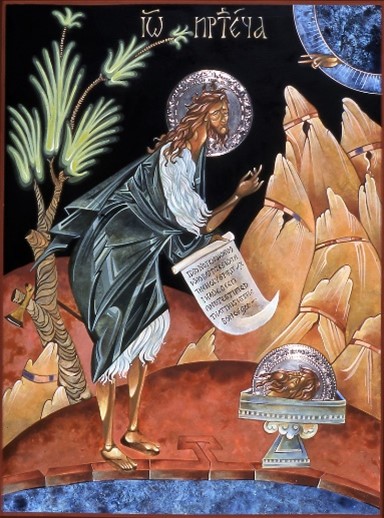
John’s desert ministry involved rather a lot of judgement. “You brood of Vipers” he declared. “Every tree that does not bear good fruit shall be cut down”. “I baptise with water for repentance but one is coming who is more powerful than me”. I don’t suppose he could have imagined that that power would be manifested in feeding people, in healing the sick, in setting people free from demons, in eating dinner with the vipers. John was perhaps expecting a little more force, and a little less fellowship; a little more liberation, and a little less love.
We too can become tired like John. We can start to look around us and say “where are you God?”, “why are we waiting?”, “is Jesus really coming?”. Like John, even the most faithful amongst us can find ourselves asking, are you the one, or do we need to wait for another?
The Psalms can be a wonderful place to turn in those moments. They are full of questions, full of doubt, full of wrestling. And full of joy. Like today (Psalm 146.5-10): “Happy are those whose hope and help is in God” (v.5). God who created all things and executes justice. Who watches over and upholds and reigns.
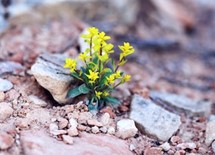
Isaiah is another excellent part of scripture to turn to with these questions. Again, it’s full of the angst of a people in exile, not sure if or when God’s going to show up in the way that they want but quietly aware that God has always been faithful. This morning’s passage from chapter 35 (verses 1-10) is a beautiful description of what it will be like when the exiles return, of God’s transforming redemption of all things: “The wilderness and dry land shall be glad, the desert shall rejoice and blossom”.
Who do we know that has spent a lot of time in the wilderness and the desert? John the Baptist. Jesus points out that the people went to the wilderness to look for something – not a wimp buffeted by the wind like a reed nor a bureaucrat trying to fool everyone in their finery – but a prophet, the true prophet. The wilderness is where God’s people have always been formed. On the edges, beyond the walls, amongst the outcasts, is time and again the landscape of our shaping and molding and creating.
Jesus says I am here, this is me. In this work on the edge, in the wilderness. Where the blind receive their sight, the lame walk, the deaf hear, the dead rise, and the poor are brought good news. The Psalms attest to it, Isaiah attests to it. This is the breaking in of the Kingdom. We might ask, will Jesus really come? He might respond, do you have eyes to see?
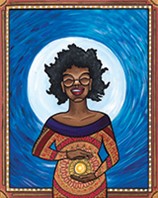 Our candle today represents joy. It comes from the first word of the introit for today in the Latin Mass: Gaudete in Domino semper, Rejoice in the Lord always. Even as we question, even as we doubt, we can still rejoice, like Mary who announced that the Mighty one has done great things in lifting up the lowly, filling the hungry with good things, and sending the rich away empty. This is the advent of heaven, which breaks in unexpectedly. God’s help and hope has no limits, if only we have eyes to see. “Everlasting joy shall be upon their heads; they shall obtain joy and gladness, and sorrow and sighing shall flee away”. Our candle today represents joy. It comes from the first word of the introit for today in the Latin Mass: Gaudete in Domino semper, Rejoice in the Lord always. Even as we question, even as we doubt, we can still rejoice, like Mary who announced that the Mighty one has done great things in lifting up the lowly, filling the hungry with good things, and sending the rich away empty. This is the advent of heaven, which breaks in unexpectedly. God’s help and hope has no limits, if only we have eyes to see. “Everlasting joy shall be upon their heads; they shall obtain joy and gladness, and sorrow and sighing shall flee away”.
What can you rejoice over today? Can you share with God your doubts and your hopes? Ask God for eyes to see the Kingdom breaking in in this world.
We pray: Stir up our prayers, Lord, and hear us: that they who are sorrowful and suffering may rejoice at the Advent of your only-begotten Son; who lives and reigns with you, in the unity of the Holy Spirit, one God, world without end. Amen.
Posted by Revd Rachael Wright on 29th November 2022
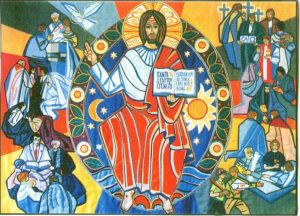
Rachael writes: Our readings on this Feast of Christ the King offer glimpses of the future. The prophet Jeremiah (23.1-6) describes how God brings all the remnant flock back to the fold where they no longer have reason for fear or dismay. Saint Paul in his letter to the Colossians (1.11-20) assures them of rescue from darkness and their share in the inheritance of the saints of light, with Christ in whom all things are reconciled. Saint Luke records in his gospel (23.33-43) that even in death Christ was offering mercy and hope to those who asked for it. I wonder which of these images resonates with you?
Today, many people will be singing Wesley’s great hymn O For A Thousand Tongues to Sing:
O for a thousand tongues, to sing
my great Redeemer’s praise,
the glories of my God and King,
the triumphs of his grace!
Jesus! the name that charms our fears,
that bids our sorrows cease;
’tis music in the sinner’s ears,
’tis life and health and peace.

A character in the detective novel I’m reading at the moment referred to their society as “a rowboat society”. “What do you mean?” someone asked him. “We move forward while always looking back,” he replied.
Immediately I thought what a perfect description that is of the Church. We are absolutely a rowing boat kind of people. We move forward at a variety of paces but really love to look back to what has gone before. Back to saints and the early church. Back to Christ. Back to the prophets; back to David, and Moses, and Abraham. Back, even, to the very beginning of all things.
Looking back like that can be a brilliant thing. It can show us where we’ve come from, that we’re still in the right lane, and if we’ve done that portion of the race then we can surely manage the next part set before us.
But today is the day in the Church calendar when we look over our shoulder and take a proper look at what is to come ahead, at where we’re going: towards Christ the King. Through whom and for whom all things were created. Who is before all things and holds all things together. Through whom all things are reconciled.
Or as the criminal on the cross beside him put it: “paradise”.
The irony is that Jesus never claimed the title of King for himself. In fact, as we heard in our reading, it was a title used to mock him. Jesus, however, is not the kind of King the world expects. He is the Prince of peace, the Light of the world, the Word become flesh. He didn’t seize dominion or battle for power but rather gave up everything. He set aside the essence of his God-ness to be with us and absorbed in himself all the terrible destructiveness of the human world, to establish a different world order and a new way, so that we might be with him in paradise.
This is the day in the year which gives me hope that one day Christ himself shall rule the earth with justice and righteousness and peace and love. That one-day there will be no reason for fear or dismay. That there shall be no more tears, no more pain, no more suffering. I look over my shoulder and I think yes!

If I’m going to keep rowing through the apathy, the misery, the commercialism, and individualism, of this world, I need to know, not just where I have come from but what I am headed for. I could just sit in my boat and let the current move me along until eventually I’ll get there. Or I could row. By the grace of God and gift of the Spirit I could row, choosing a different way and seeking to see that paradise in this world, in this life. That paradise which is manifested in how I speak to people, how I care for my neighbour, how I pay my employees, how I use my position on the board of trustees, how I raise my children and teach my grandchildren. In how I pray and how I hope.
We can all row, knowing where we’ve come from but also with the sure and certain hope of looking Jesus, Christ the King, the Light of the World, full in the face as he says, “today you will be with me in paradise”.
We pray: Almighty and everlasting God, whose will it is to restore all things in the kingdom of your well-beloved Son: mercifully grant that the peoples of the earth, now divided and enslaved by sin, may be freed and brought together under his most gracious rule; through the same Jesus Christ, our Lord, who lives and reigns with you, in the unity of the Holy Spirit, one God, world without end. Amen.
Perhaps you’d like to sing or pray these closing verses of our hymn:
He speaks; and, listening to his voice,
new life the dead receive,
the mournful broken hearts rejoice,
the humble poor believe.
My gracious Master and my God,
assist me to proclaim
and spread through all the earth abroad
the honours of thy name.
Rachael writes: I saw the image below online in the week. Yellow and black like a hazard warning sign for nuclear waste, at the top a big fish with its mouth open is chasing after little fish. Underneath them it says “Do not panic”. Below that, the picture is of the big fish now facing the other direction and all the little fish have arranged themselves to look like an even bigger fish that almost has its mouth around the original big fish. Underneath that it reads “organise”. “Do not panic – organise”.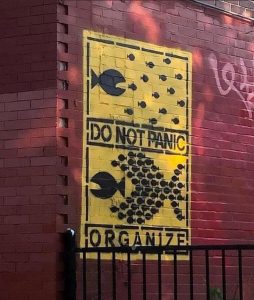
Our story from Jesus this morning (in Luke 18.9-14), of a Pharisee and a tax collector, is just the next part of the same speech that last week’s story of the unjust judge and the persistent woman came from. Jesus offers both in answer to a question from the real-life Pharisees about when the Kingdom of God would be coming.
Initially Jesus responds to them by saying “the Kingdom of God is among you”. Then he offers the story of justice and faith: of a woman who perseveres and of God who respects and deeply cares for people. And he follows that up with another dichotomy between two opposing characters. This is what the Kingdom of God is like, Jesus says: a Pharisee and a tax collector.
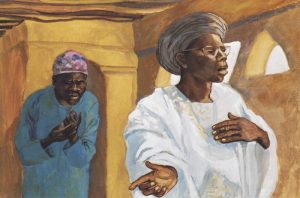
If you had to describe the Pharisee in one word, you might choose “arrogant”. And if asked to do the same for the tax collector, “humble” may well be the word that comes to mind. It comes from the most common Christian interpretation of this passage which many of us will have heard before. However, if we go down the road of Pharisee equals judgemental and bad, and tax collector equals humble and good, as we denounce one character and celebrate the other we find ourselves engaging in the very behaviour that we’re saying the parable condemns. Is there an alternative?
Well first, let’s re-cast the actors based on what we know of historical Jewish culture and religious practice. The Pharisee, amongst first century Jews, would have symbolised a beloved teacher, a pillar of the community, someone deeply admired. The tax-collector, on the other hand, represents a wealthy bootlicker of the 1% and co-conspirator with the occupying enemy.
While the Pharisee is often read as being someone who is taking pride in his own efforts, his first words point to a humble awareness of his need of God. “God, I thank you” he says. We seem to assume that they are empty words but what if this is genuine gratitude and praise for the way his life has turned out and for God’s provision for his ministry? The Pharisee goes above and beyond the law which requires him to fast only on certain feasts (not twice a week as Jesus says he does) and to tithe from the proceeds of his agricultural income (rather than from everything he earns). Both his fasting and his tithing would have been about helping his community which was subject to a brutal occupation. He was contributing to their financial assistance and pleading (like our woman before the judge) for God’s mercy on the Jewish people. His proclamation can be read as self-aggrandisement with a side of contempt for others, or it can be considered heartfelt gratitude and a declaration of reliance on God. Something more like “for there but by the grace of God go I”.
And what about our tax collector? Christ’s Jewish hearers may have eagerly anticipated a wonderful story of redemption where the tax collector engaged in the teshuva or “atonement” rituals and turned his life around, after all, a story of someone who has wronged you being sorry and doing their penance can be deeply cathartic. To have completed these familiar rituals properly the tax collector would have had to admit the harm that he had done, apologise, done all that he could to repair that harm, felt and expressed sincere regret, vowed not to do the same again, and offered a sacrifice in the Temple as a public and religious acknowledgement of his wrong doing. Even then the process of atonement would only be complete when he had opportunity to do the wrong again but chose not to. We don’t get any of that. Just a meagre request for mercy before he trots off home with no word of whether he is going to leave behind his lucrative profession. The listeners may well have been troubled that Christ declared him justified after so little evidence of repentance.
So where does a new understanding of the characters leave us in understanding what Jesus was trying to say with the parable? Well, it all turns on one four letter Greek word: “para”. In our bibles it is translated as “rather than”. But it also means “with”, “alongside”, and “because of”. The tax collector was justified with the Pharisee. The tax collector was justified because of the Pharisee.

Remember this is a parable about the Kingdom of God. Despite all the things that might divide or separate them, or what his listeners might think of them, I believe that Jesus is saying they are both part of it. All through the gospels we see Christ invite disparate people: pharisee and tax collector, fisherman and zealot, prostitute and centurion, to be part of the Kingdom community. He reminds us that we are interconnected and interdependent because God made us so. Christ calls us to remember that. To re-member it. To, by God’s help, put it back together.
It means that when we’re faced with the scary and anxiety inducing things happening in our world, our country, and our community: we do not panic, we organise. And together, as a Kingdom community, we seek a Kingdom kind of justice. “When is the Kingdom of God coming?” the Pharisees asked. “The Kingdom of God is among you”, Jesus replied. In justice and community. Amen, may it be so.
O God, in your mercy: grant your people humility and gratitude, that, inspired by your love and strengthened by your Spirit, they may live and work to spread your justice and deepen community, as a sign of your Kingdom; through Jesus Christ, our Lord, who lives and reigns with you, in the unity of the Holy Spirit, one God, world without end. Amen.
Rachael writes: We’ve been doing harvest themed assemblies and services in the schools all this week. We’ve been asking the children to think about their food, where it comes from, and who it connects them to.
 Think about the food in your own house. Can you see your cupboards, your fridge, or your freezer from where you’re sitting? Open them in your mind’s eye to see the food within. Can you see your secret stash of chocolate biscuits on the top shelf that no-one else can reach?! Think about the food in your own house. Can you see your cupboards, your fridge, or your freezer from where you’re sitting? Open them in your mind’s eye to see the food within. Can you see your secret stash of chocolate biscuits on the top shelf that no-one else can reach?!
As you’re reading, can you see the spot where you normally eat your food, or rather what you set your plate or bowl on to eat? Is it a table? Or a breakfast bar? A comfy chair and lap tray?
I wonder if you can think of a meal that you’ve recently enjoyed eating around a table? Think back to who you were with, what you ate, and how you felt at that meal?
In our first reading this morning (Deuteronomy 26.1-11), the people of Israel are instructed to celebrate the harvest by eating a meal together in the temple, in their place of worship. And in the Gospel (Mark 2.13-17), Jesus is eating with all different kinds of people who the strict religious types didn’t approve of. Jesus said that at that table, with those people, was where he belonged.

Times of eating together are really important. They build community and relationships. In eating a meal together, we learn to speak and to listen. To share and to serve. At a table like that, everyone is equal, everyone is unified.
On our tables, everything is interconnected. Creation and people many thousands of miles away in circumstances wildly different to our own are represented in plates, cups, foods, and ingredients, that have come from the earth and been produced by human hands other than our own. In our meals we are reminded of our reliance on nature, our fellow human beings, and on God.
In the church we gather around the table of the altar to share the meal of the Eucharist. That simple sharing of bread and wine communicates to each of us the incredible love of God, known in the life, death, and resurrection, of Jesus. It also shows us something of what the Reign of God on earth as in heaven might look like – that a disparate people is gathered together and no matter their circumstances shares the same bread and wine as equals and siblings.
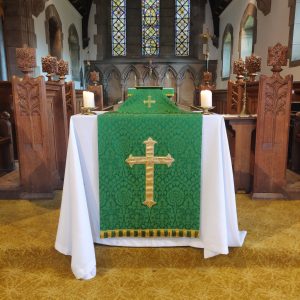 Every table and every meal can be a reminder of that meal. Because from the altar we are sent back to the tables in our homes and invited to share there the same loving fellowship with neighbours and friends, with those who are lonely, lost, or lacking. We’re sent to bring a little of heaven to earth, to share abroad God’s love, with whatever energy, time, and means, that we have. Every table and every meal can be a reminder of that meal. Because from the altar we are sent back to the tables in our homes and invited to share there the same loving fellowship with neighbours and friends, with those who are lonely, lost, or lacking. We’re sent to bring a little of heaven to earth, to share abroad God’s love, with whatever energy, time, and means, that we have.
Maybe it’s been a long time since you came to the altar. I would invite you to come if you are able, to receive and be fed, in order to be strengthened for this task we are given. And if you can’t come to the altar, the great news is that it can come to you! Myself, Nerys, and the Pastoral Team, would be delighted to bring the Reserved Sacrament to your home to share, just let us know if you’d like us to.
As we pray, and in response to our harvest celebration, I invite you to think about someone you could share your hospitality with, share your blessings and harvest with. Maybe a friend or neighbour. Someone at school or work or a club that you go to. It might an individual or a group. Hold them in your mind. And then tell God the kinds of things you’d like to share with them. It could be food but also your talents or something else that might meet their need or help you to come together. Ask God for help in doing this.
Let us pray:
God, in whom all things are possible, You crown the year with your goodness and give us the fruits of the earth in their season: grant that we may use them to your glory, so that none may hunger, none may thirst, and all may cherish the gifts of your creation, through Jesus Christ our Lord, who lives and reigns with you and the Holy Spirit, one God, now and for ever. Amen.
|



 We know that that is true, in the sense that it is factual. To call a rose a table doesn’t suddenly make it a table. But we also know the importance of names. Parents agonise over what to call their children. There are hundreds and hundreds of websites out there with millions of names listed to help them choose. You can take tests and questionnaires to find the perfect name for your baby. It’s generally the second question asked of parents to be, after what the gender is, “have you chosen a name”. Because in that we think we can grasp something of the (still yet unborn) child’s identity. The name tells us a story, gives us a glimpse of their future.
We know that that is true, in the sense that it is factual. To call a rose a table doesn’t suddenly make it a table. But we also know the importance of names. Parents agonise over what to call their children. There are hundreds and hundreds of websites out there with millions of names listed to help them choose. You can take tests and questionnaires to find the perfect name for your baby. It’s generally the second question asked of parents to be, after what the gender is, “have you chosen a name”. Because in that we think we can grasp something of the (still yet unborn) child’s identity. The name tells us a story, gives us a glimpse of their future. Somehow that name made its way into common parlance as an expletive and that has only served to cheapen something which should be holy and awe-inspiring. We can easily forget the meaning and the one to whom it belongs and throw “Jesus” around like it’s “Jo” “Jack” or “Jane”. There are two contemplative prayers which I use where saying the name of Jesus, though not really the primary function of the prayer, has become a very powerful spiritual practice for me. One is the Jesus prayer (“Lord Jesus Christ, Son of God, have mercy on me a sinner”) and the other is the rosary (“Hail Mary full grace, the Lord is with thee…blessed is the fruit of thy womb Jesus”). It’s declaratory and worshipful, humbling and hopeful, to say the name of Jesus in prayer.
Somehow that name made its way into common parlance as an expletive and that has only served to cheapen something which should be holy and awe-inspiring. We can easily forget the meaning and the one to whom it belongs and throw “Jesus” around like it’s “Jo” “Jack” or “Jane”. There are two contemplative prayers which I use where saying the name of Jesus, though not really the primary function of the prayer, has become a very powerful spiritual practice for me. One is the Jesus prayer (“Lord Jesus Christ, Son of God, have mercy on me a sinner”) and the other is the rosary (“Hail Mary full grace, the Lord is with thee…blessed is the fruit of thy womb Jesus”). It’s declaratory and worshipful, humbling and hopeful, to say the name of Jesus in prayer.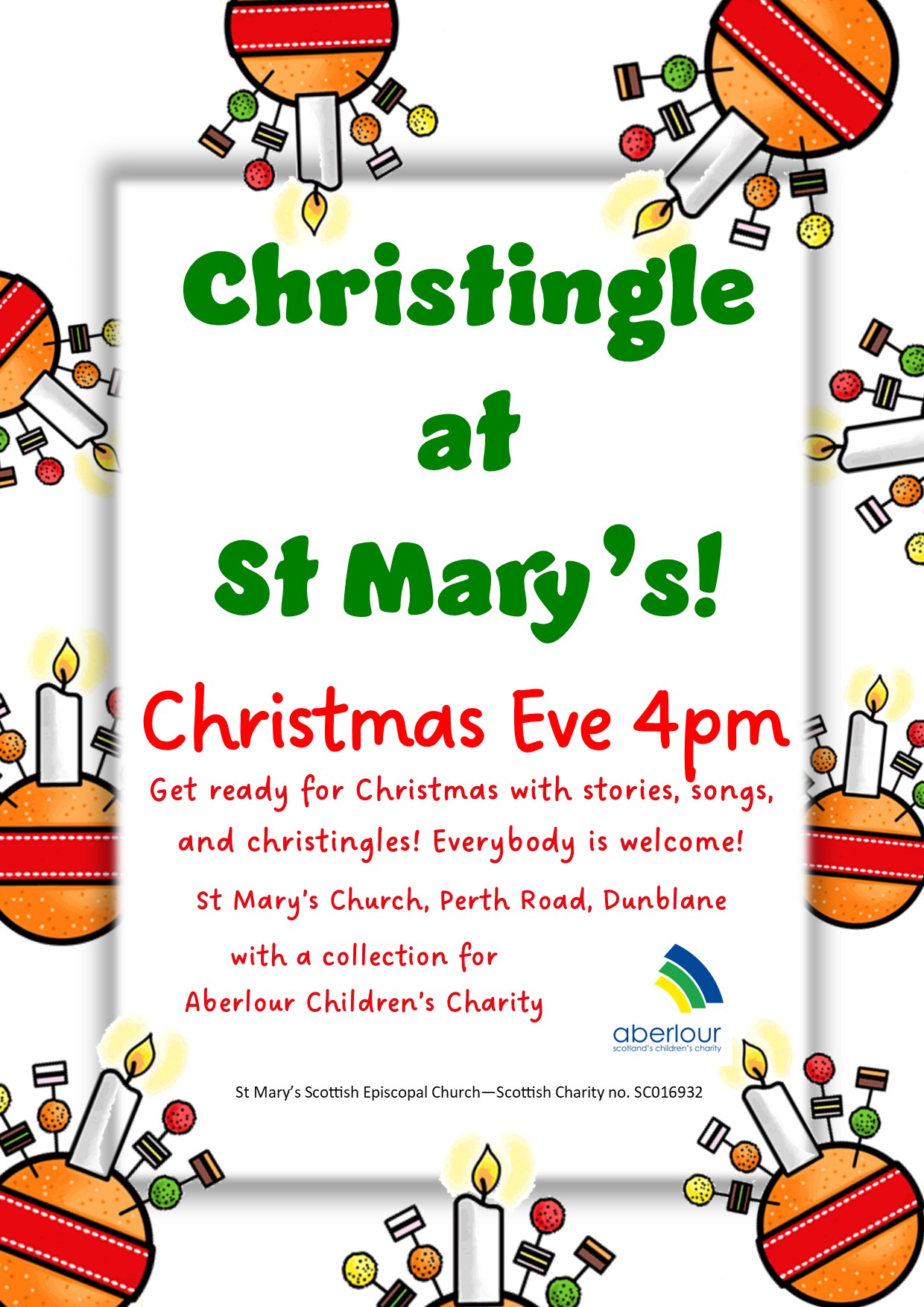


 Our candle today represents joy. It comes from the first word of the introit for today in the Latin Mass: Gaudete in Domino semper, Rejoice in the Lord always. Even as we question, even as we doubt, we can still rejoice, like Mary who announced that the Mighty one has done great things in lifting up the lowly, filling the hungry with good things, and sending the rich away empty. This is the advent of heaven, which breaks in unexpectedly. God’s help and hope has no limits, if only we have eyes to see. “Everlasting joy shall be upon their heads; they shall obtain joy and gladness, and sorrow and sighing shall flee away”.
Our candle today represents joy. It comes from the first word of the introit for today in the Latin Mass: Gaudete in Domino semper, Rejoice in the Lord always. Even as we question, even as we doubt, we can still rejoice, like Mary who announced that the Mighty one has done great things in lifting up the lowly, filling the hungry with good things, and sending the rich away empty. This is the advent of heaven, which breaks in unexpectedly. God’s help and hope has no limits, if only we have eyes to see. “Everlasting joy shall be upon their heads; they shall obtain joy and gladness, and sorrow and sighing shall flee away”.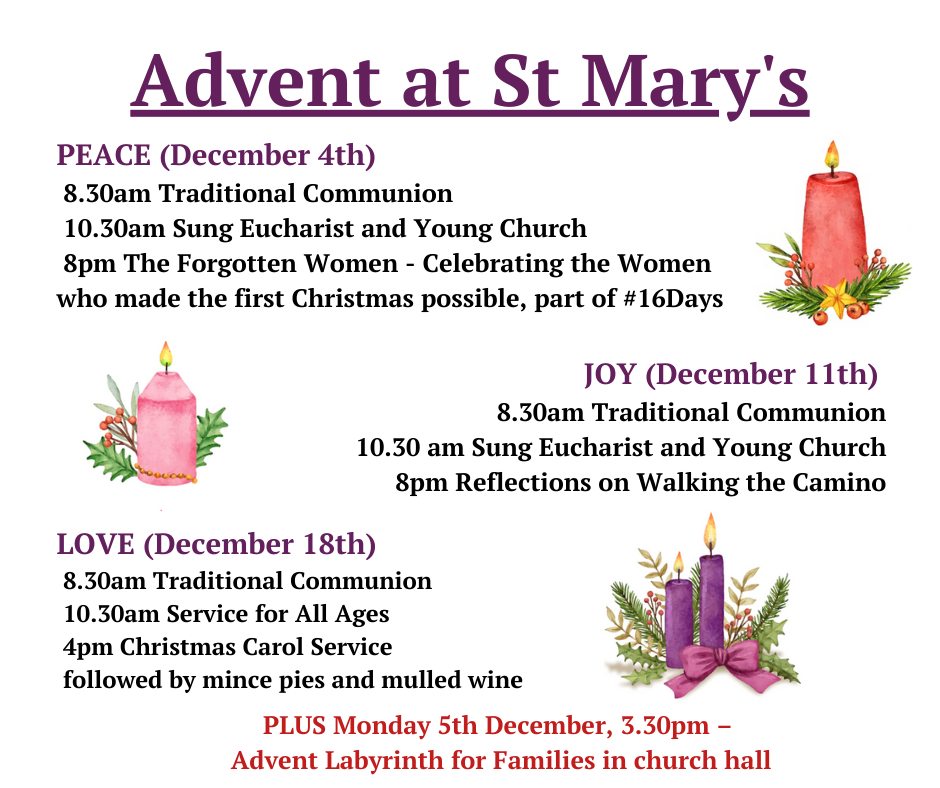






 Think about the food in your own house. Can you see your cupboards, your fridge, or your freezer from where you’re sitting? Open them in your mind’s eye to see the food within. Can you see your secret stash of chocolate biscuits on the top shelf that no-one else can reach?!
Think about the food in your own house. Can you see your cupboards, your fridge, or your freezer from where you’re sitting? Open them in your mind’s eye to see the food within. Can you see your secret stash of chocolate biscuits on the top shelf that no-one else can reach?!
 Every table and every meal can be a reminder of that meal. Because from the altar we are sent back to the tables in our homes and invited to share there the same loving fellowship with neighbours and friends, with those who are lonely, lost, or lacking. We’re sent to bring a little of heaven to earth, to share abroad God’s love, with whatever energy, time, and means, that we have.
Every table and every meal can be a reminder of that meal. Because from the altar we are sent back to the tables in our homes and invited to share there the same loving fellowship with neighbours and friends, with those who are lonely, lost, or lacking. We’re sent to bring a little of heaven to earth, to share abroad God’s love, with whatever energy, time, and means, that we have.